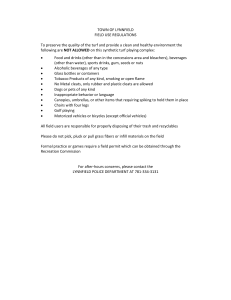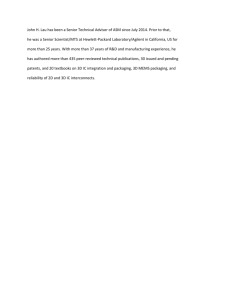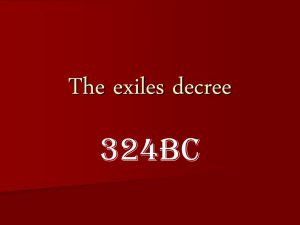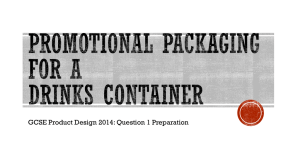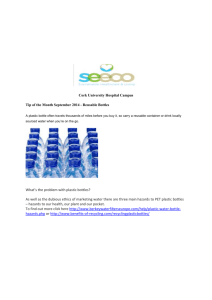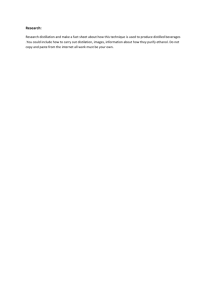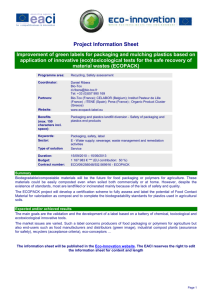Ontwerp-Aanvulling Uitvoeringsbesluit
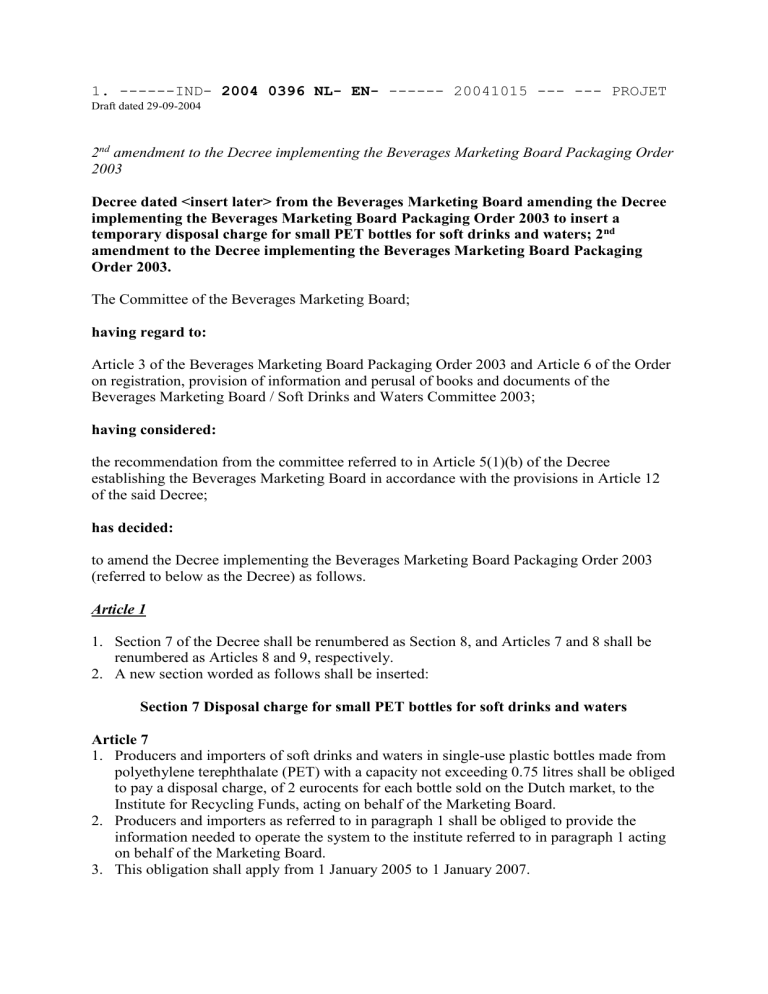
1. ------IND 2004 0396 NL- EN ------ 20041015 --- --- PROJET
Draft dated 29-09-2004
2 nd
amendment to the Decree implementing the Beverages Marketing Board Packaging Order
2003
Decree dated <insert later> from the Beverages Marketing Board amending the Decree implementing the Beverages Marketing Board Packaging Order 2003 to insert a temporary disposal charge for small PET bottles for soft drinks and waters; 2 nd amendment to the Decree implementing the Beverages Marketing Board Packaging
Order 2003.
The Committee of the Beverages Marketing Board; having regard to:
Article 3 of the Beverages Marketing Board Packaging Order 2003 and Article 6 of the Order on registration, provision of information and perusal of books and documents of the
Beverages Marketing Board / Soft Drinks and Waters Committee 2003; having considered: the recommendation from the committee referred to in Article 5(1)(b) of the Decree establishing the Beverages Marketing Board in accordance with the provisions in Article 12 of the said Decree; has decided: to amend the Decree implementing the Beverages Marketing Board Packaging Order 2003
(referred to below as the Decree) as follows.
Article 1
1.
Section 7 of the Decree shall be renumbered as Section 8, and Articles 7 and 8 shall be renumbered as Articles 8 and 9, respectively.
2.
A new section worded as follows shall be inserted:
Section 7 Disposal charge for small PET bottles for soft drinks and waters
Article 7
1.
Producers and importers of soft drinks and waters in single-use plastic bottles made from polyethylene terephthalate (PET) with a capacity not exceeding 0.75 litres shall be obliged to pay a disposal charge, of 2 eurocents for each bottle sold on the Dutch market, to the
Institute for Recycling Funds, acting on behalf of the Marketing Board.
2.
Producers and importers as referred to in paragraph 1 shall be obliged to provide the information needed to operate the system to the institute referred to in paragraph 1 acting on behalf of the Marketing Board.
3.
This obligation shall apply from 1 January 2005 to 1 January 2007.
Article 2
This Decree shall enter into force on the day following its publication in the Trade Journal.
Article 3
This Decree may be cited as “2 nd
amendment to the Decree implementing the Beverages
Marketing Board Packaging Order 2003”.
<Place + date>
P.M. Blauw, Chairman
J.J. Schat, Secretary
2 / 4
EXPLANATORY STATEMENT:
2 nd amendment to the Decree implementing the Beverages Marketing Board Packaging
Order 2003
Section 1. General
This Implementing Decree introduces a temporary disposal charge in order to finance a number of trial projects for setting up a national collection and recycling system for small PET bottles for soft drinks and waters in the Netherlands. The charge will be levied from 1 January 2005 to 31 December 2006, inclusive. For more information on the background, please refer to Section 2.
The Marketing Board is a trade association under public law as referred to in the Industrial
Organisation Act (referred to below as WBO), which was established by an Act on 1 July 2002. The
Marketing Board was established as the successor to the Beer Marketing Board, the Soft Drinks and
Waters Association, the Distilled Drinks Marketing Board and the Association for the Retail Trade in
Alcoholic Drinks, which all legally ceased to exist on 1 July 2002.
This amendment of the Implementing Decree has been notified to the European Commission under number <COMPLETE>.
The Marketing Board is responsible for encouraging businesses in the beverages sector to run their operations in a way that serves the general interest, and to promote the common interests of those businesses and of the people involved.
The Committee of the Marketing Board (referred to below as the Committee) is made up of people appointed from employer and employee organisations in the beverages sector. The Committee is assisted by four committees as per Article 88a WBO, namely the Beer Committee, the Soft Drinks and
Waters Committee, the Distilled Drinks Committee and the Off-Licences Committee, each with their field of activity in the relevant sector within the Marketing Board.
Section 2. Objectives pursued and expected (side) effects of the Implementing Decree
This amendment has the following objective: to implement European and national environmental policy as set out, inter alia , in the European Packaging and Packaging Waste Directive and the
Packaging Agreement III, concentrating on the collection and recycling of plastic packaging in the
Netherlands. Specifically, the intention is to recycle small PET bottles, which are currently not collected separately but are disposed of in the household waste (and are therefore incinerated), to a high quality.
This measure is connected to the removal of the requirement that large PET bottles for soft drinks and waters (with a capacity exceeding 0.5 litres) be placed on the market (almost) exclusively as refillable bottles. That requirement was laid down in the Packaging Agreement III. Now that the requirement has lapsed, the associated slight increase in environmental pollution is compensated for by collecting and recycling small PET bottles separately. A number of trial projects will be used to test whether a collection system combined with special rubbish bins is effective.
The Institute for Recycling Funds will levy the charge at the proposal of the Marketing Board’s Soft
Drinks and Waters Committee and in the name of the Board’s Committee. This institute will organise the trial projects set up to test the operation of the system with the special rubbish bins.
3 / 4
Section 3. More detailed justification of public legislation regarding the Implementing Decree
Experience in other countries with the “Green Dot” systems and comparable collection systems for plastic bottles shows that this sort of system can only have a chance of success if all the producers and importers on the market concerned participate. This can only be regulated via public law.
Section 4. Implementation and enforcement aspects
The Decrees enacted on the basis of this Implementing Decree do not entail any additional burden for government institutions. The administrative burden for the businesses on which this obligation is imposed will increase somewhat, because details of the quantity of bottles sold on the Dutch market will be requested monthly, and an auditor’s statement regarding the information provided will be requested once a year. The importance of the improvement in environmental protection provided by this system, however, easily balances out this slight increase in the administrative burden.
Section 5. Relationship with other legislation and
with existing and future international and Community regulations
This relates to the interpretation and/or implementation of the European Directive on packaging and packaging waste and of related national environmental policy.
The Hague, <date>
P.M. Blauw, Chairman
J.J. Schat, Secretary
4 / 4
